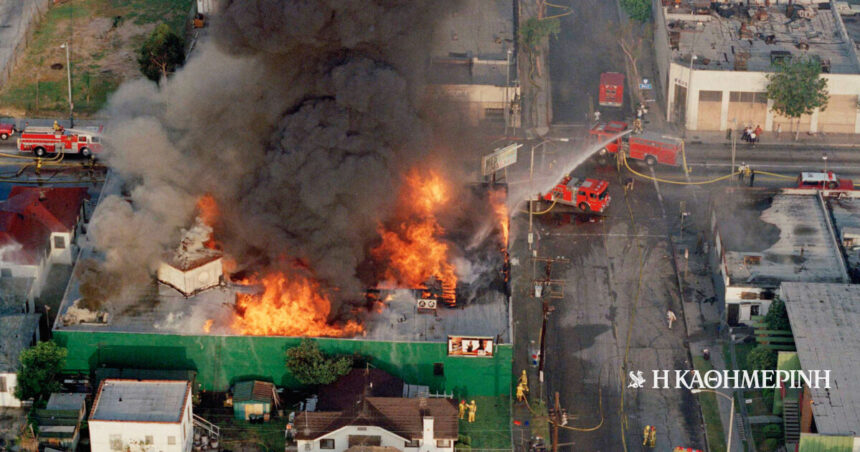On April 29, 1992, the Court of Court of Justice in Simi Valley California He announced the acquittal of four white police officers who had been accused of the violent beating of African -American Rodney King. The verdict was not just a legal decision. On the contrary, it served as a fuse for the explosion of mass and violent riot to Los Angeles and in other areas of United Statesrevealing in its entirety the anger of a society that has been experiencing the consequences of institutional inequality, police arbitrariness and racial bias for decades.
His case Rodney King It had already caused a worldwide shock more than a year before the decision, when on March 3, 1991, the 25 -year -old African -American, after a brief pursuit of excessive speed, was stopped by Los Angeles police officers and was savagely beaten. The scene was recorded in a video by amateur operator George Holliday, from the balcony of his apartment. The video, lasting about 80 seconds, showed King unarmed and fallen to the ground, while receiving constant blows by four police officers, with no apparent threat on his part.
Viewing the video by the media caused a general outcry. The incident was considered Symptom of deep -rooted racism and violence Inside the Los Angeles police force, already accused of African -American and Latin American communities for arbitrary and brutal practices. The Ministry of Justice and the FBI have been directing proceedings immediately to examine the case, while the four police officers were brought to trial for use of excessive violence.
The body of the jury consisted almost exclusively of white.
However, the trial was not held in California, but was transferred to Simi Valley, a small town in the suburbs of Los Angeles, mainly inhabited by whites. The body of jurors consisted almost exclusively of white citizens, which from the beginning caused concerns about the impartiality of trial. When the verdict was announced on April 29, 1992, and the defendants were acquitted by all the basic categories, the shock and indignation that followed were immediate and extensive.
Within a few hours of the announcement of the decision, riots broke out in South Los Angeles. Angry protesters clashed with police while noting dozens of arson and looting businessmainly in neighborhoods that had a long history of social exclusion.
The violence spread rapidly, with authorities losing control for several days. In the area of Florence and Normandie, which was the “zero point” of the uprising, they were recorded Public beatings of white drivers by furious protesters, while businesses and houses were wrapped in flames.
For the first time since the 1960s, the US military was called upon to intervene.
The National Guard was invited to intervene, and, for the first time since the 1960s, the US military was sent to help restore order. Los Angeles Police, in the midst of a fierce criticism of a delayed and inadequate reaction, remained weakened throughout the episodes.
The final account was tragic: 63 dead, over 2,000 injuries and damage to them height exceeded $ 1 billion. Thousands of businesses, mainly Korean-American property, were completely destroyed. The explosion of rage was a reaction not only to an acquittal but to decades of oppression, poverty, racial inequality and frustration by the judicial system and more generally by the existing US context.

In the days that followed, Rondney King himself publicly appeared and sent a peace message, saying the phrase in history: “Can we all get all?” – “Cann’t we all do well?” This call, though symbolic, emphasized the human core behind the facts: the need for unity, understanding and change.
The King case, the riots of 1992 and their consequences remain a reference point in the public debate on police violence and racial justice in the United States. Despite the expiration of three decades, April 29 is still causing discussions, analyzes and comparisons with modern incidents, such as those that triggered the movement Black Lives Matter.
Column Curator: Myrto Katsiera, Vassilis Menakakis, Antigoni-Despina Poumenidou, Athanasios Syroplakis




